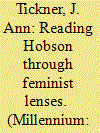| Srl | Item |
| 1 |
ID:
133557


|
|
|
|
|
| Publication |
2014.
|
| Summary/Abstract |
In this article, I suggest ways in which feminist analysis would further enrich Hobson's text. Questioning Hobson's assumption that it is possible to create separate 'metanarratives' about Eurocentrism and patriarchy, I claim that patriarchy, imperialism and Eurocentrism were co-constituted through the practices of Western imperialism and the creation of modern Western knowledge. I then take up Hobson's question that asks whether one is, or is not, Eurocentric is a more important question than whether or not one is a positivist. I argue that both these questions are important and interrelated. Whereas positivism aspires to tell one universal story, post-positivism acknowledges that all theories are constructed in the interest of someone. Therefore it offers us the opportunity to be reflective about our epistemological standpoints - whether or not they are Eurocentric. I then describe some methodological sensitivities concerning these issues that IR feminists have brought to their research. I conclude by reviewing some feminist post-colonial literature that reflects these sensitivities, thereby offering us some tools to overcome the Eurocentric trap.
|
|
|
|
|
|
|
|
|
|
|
|
|
|
|
|
| 2 |
ID:
060418


|
|
|
|
|
| Publication |
Mar 2005.
|
| Summary/Abstract |
Methodological issues have constituted some of the deepest sources of misunderstanding between International Relations (IR) feminists and IR theorists working in social scientific frameworks. IR theorists have called upon feminists to frame their research questions in terms of testable hypotheses. Feminists have responded that their research questions cannot be answered using social science explanatory frameworks. Deep epistemological divisions about the construction and purpose of knowledge make bridging these methodological divides difficult. These epistemological standards lead feminists to very different methodological perspectives. Asking different questions from those typically asked in IR, many IR feminists have drawn on ethnographic, narrative, cross-cultural, and other methods that are rarely taught to students of IR, to answer them. Drawing on a range of interdisciplinary scholarship on feminist methodologies and some recent IR feminist case studies, this article analyzes and assesses how these methodological orientations are useful for understanding the gendering of international politics, the state and its security-seeking practices and its effects on the lives of women and men
|
|
|
|
|
|
|
|
|
|
|
|
|
|
|
|
| 3 |
ID:
191962


|
|
|
|
|
| Summary/Abstract |
This review essay engages three texts focused on women who engaged with international thought in the early to mid-20th century. Women’s International Thought: A New History and Women’s International Thought: Towards a New Canon, both edited by Patricia Owens and her co-editors. The third, To Turn the Whole World Over: Black Women and Internationalism, edited by Keisha Blain and Tiffany Gill. A few women discussed in these texts are recognized today, most are completely forgotten. Some aspired to careers in the academy but encountered obstacles on account of their sex and/or race. Many were scholar activists who claimed that their writings should address real world problems. These texts foreground the work of African American scholars, focused on racism and imperialism, subjects that IR ignores. Since some were denied publication outlets many wrote journals and published in newspapers. Although previously ignored, all these women had important things to tell us about international relations.
|
|
|
|
|
|
|
|
|
|
|
|
|
|
|
|